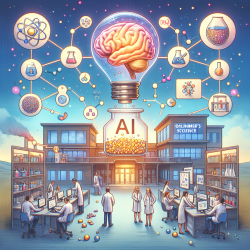Alzheimer's disease (AD) presents a formidable challenge in the realm of neurodegenerative disorders. With an estimated 6.7 million Americans aged 65 and older living with AD today, the need for effective treatments is critical. Despite significant efforts, the attrition rate for AD clinical trials remains high at 98%. This highlights a pressing need for innovative approaches to drug discovery and development.
The Role of Artificial Intelligence in Alzheimer's Research
The recent research article "Artificial intelligence and open science in discovery of disease-modifying medicines for Alzheimer’s disease" sheds light on how AI can transform the landscape of AD drug development. By leveraging big data from electronic health records and multi-omics profiles, AI accelerates therapeutic development efforts, offering hope for new treatments.
Key Insights from the Research
- AI and Big Data: The convergence of advanced computing power and big data provides unprecedented opportunities for scientific discovery. AI tools can analyze vast datasets to identify novel therapeutic targets beyond the traditional amyloid hypothesis.
- Collaborative Efforts: Success in this field requires collaboration among neurologists, geneticists, pharmacologists, and computational scientists. By working together, these experts can expedite drug discovery processes.
- Disease-Modifying Therapies: AI-driven approaches are already improving drug discovery timelines, sometimes delivering new candidate therapeutics within months rather than years.
Practical Applications for Practitioners
Practitioners can play a pivotal role in advancing AD research by integrating AI tools into their practice. Here are some ways they can contribute:
- Stay Informed: Regularly attend conferences, webinars, and read publications on AI advancements in healthcare to stay updated on the latest developments.
- Collaborate with Researchers: Engage with interdisciplinary teams to contribute clinical insights that can enhance AI models used in drug discovery.
- Pilot New Technologies: Implement AI-driven diagnostic tools and treatment protocols in clinical settings to gather real-world data that can inform future research.
- Pursue Further Research: Encourage academic institutions to focus on AI applications in neurodegenerative diseases, fostering an environment of innovation.
The Future of Alzheimer's Treatment
The integration of AI and open science holds immense promise for transforming AD treatment. By embracing these technologies, practitioners can contribute to a future where effective therapies are readily available. As we continue to explore the potential of AI in healthcare, it is crucial to remain committed to ethical considerations and patient-centered care.










